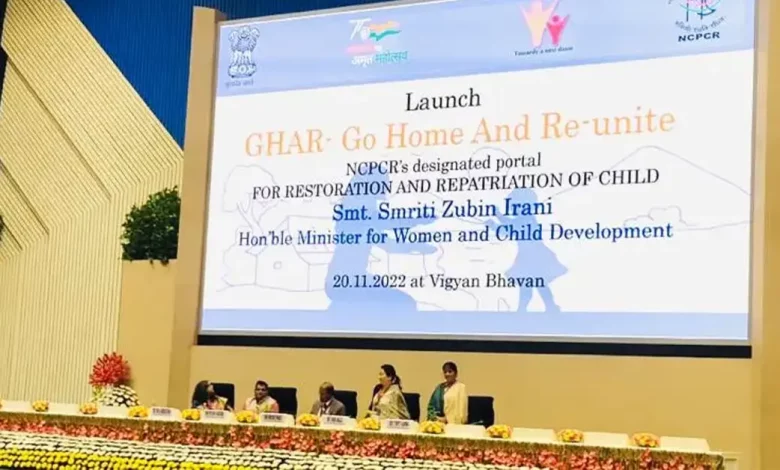Daily Current Affairs for UPSC
GHAR Portal
Syllabus: Government Policies and Interventions[GS Paper-2]

Context: The Ministry of Women and Child Development has created a platform called the “Track Child Portal” that allows for the monitoring of missing and recovered children in various states and territories, including Maharashtra, Chhattisgarh, North Eastern States, and Jharkhand.
About:
- The Go Home and Re-Unite (GHAR) Portal, developed by the National Commission for Protection of Child Rights (NCPCR), serves the purpose of digitally monitoring and tracking the restoration and repatriation of children in accordance with the guidelines set forth in the Juvenile Justice (Care and Protection of Children) Act of 2015.
- However, 5175 children have already been registered on the GHAR Portal as officially registered cases, which means that they have been fully recognized and wish to be reunited with their families.
- The Ministry of Women and Child Development has developed the “Track Child Portal” to trace the missing and found children in all States UTs.
- This portal is linked to the CCTNS of the Ministry of Home Affairs.
- It provides a “Khoya-Paya” feature which allows citizens to report a missing or a child seen in public places.
Key Features of the portal:
- This system can be applied to a child in the Juvenile Justice system if this child is to be moved from one country, state, or district to another.
- It enables the facile digital transfer of their cases to the relevant authorities in a timely manner, regarding an easy repatriation.
- For requesting translators or interpreters the language support is also there.
- The restoration and rehabilitation of the child’s own case can be digitally monitored by Child Welfare Committees and District Child Protection Officers.
- A checklist format is presented for screening the children who are harder to repatriate or those not receiving compensation.
- The system also includes the Government schemes to control the families and to keep the children with their family at the regeneration
National Commission for Protection of Child Rights (NCPCR):
- The National Commission for Protection of Child Rights (NCPCR) is an official organisation in India that was created by the CPCR Act of 2005.
- It began functioning on March 5, 2007, and falls under the authority of the Ministry of Women and Child Development, which is part of the Indian government.
- The mandate of the National Commission for Protection of Child Rights (NCPCR) is to ensure that all laws, policies, programs, and administrative mechanisms are in line with the rights of children as stated in the Indian Constitution and the UN Convention on the Rights of the Child.
- According to the commission, a child is defined as someone who is under the age of 18.
Functions of NCPCR:
- The organisation is responsible for
- examining and evaluating measures to protect child rights
- providing reports to the government on these measures
- investigating violations of child rights
- addressing issues faced by children in various situations
- studying international instruments and policies on child rights
- promoting research and awareness on child rights
- inspecting facilities and taking action when needed, addressing complaints related to child rights
- analysing existing laws and practices for compliance with child rights conventions
- conducting investigations based on concerns expressed by children or others
- advocating for the consideration of children’s perspectives in its work and government departments.
Conclusion:
This initiative shows that the government is dedicated to using technology to help and protect children, making sure they are fully supported and helped in their recovery and rehabilitation process.
Source: PIB





.png)



